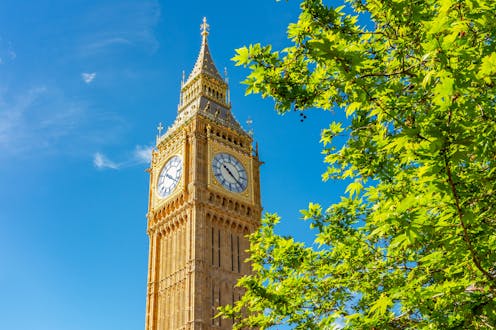
As far as the UK government is concerned, its backbenchers are “the most important Members in the House [of Commons]”. This simple insight, from a classic 1976 article by the political scientist Anthony King, could not have been demonstrated more clearly during the previous 14 years of Conservative rule.
While protests from opposition MPs were generally ignored, policy questions from housing to Brexit were often dictated by debates within the Conservative parliamentary party.
Climate policy is no different from any other policy area in this regard. That’s why researchers have started to poll politicians to test their attitudes to the issue in various countries. This has included comparing levels of climate concern among Finnish citizens and elites, evaluating who Norwegian politicians and voters deem responsible for tackling climate change, and assessing what politicians in the US and China believe citizens’ views on climate change are.
In new research I conducted with Alan Wager of the Tony Blair Institute, we used a similar approach to analyse polling of British MPs’ and voters’ attitudes to climate change.
The polling we used was of MPs in the previous parliament, between 2019 and 2024. Still, there are important insights that help us to understand the MPs in the new parliament, elected in 2024. First, we found that what party they belonged to was important in predicting what MPs would think about climate change.
Indeed, what party they belonged to was more important in predicting an MP’s views on climate change than differences in how they perceived voters’ attitudes to the issue.
Second, we found across several metrics Labour MPs were clearly more “pro-climate” than Conservatives. They were more supportive of the UK’s net zero target, more bullish about the benefits of tackling climate change and more in favour of some suggested climate policies.
Labour backbenchers will mostly be pro-climate
Though we cannot be certain, a similar party dynamic will probably be in place in the new parliament. Indeed, several newly elected Labour MPs have a background as key figures in the climate movement.

There is already evidence that Labour MPs are more congenial to climate policy than their Conservative predecessors. David Cameron introduced planning restrictions on onshore windfarms in 2015 in response to a campaign from his backbench Conservative MPs. Since then, Conservative prime ministers and ministers were open to reversing these restrictions at various points, but ultimately did not because of continued opposition among Conservative backbenchers.
The new Labour government has removed these restrictions within days with no sign of dissent from their backbenches.
Even where the Conservatives could point to progress in areas of climate policy they sometimes appeared embarrassed to talk about them. This was no doubt partly to avoid aggravating their more anti-net zero MPs, including the formal Net Zero Scrutiny Group (though most of them lost their seats at this election).
Expect some local opposition
Specific aspects of Labour’s net zero plans will probably prove controversial even within their parliamentary party. For instance, Labour’s 2030 clean power target requires new infrastructure such as turbines and pylons, and there are Labour MPs representing more rural seats where that may prove controversial.
Unions such as the GMB have also been pushing back on the party’s plans to curtail oil and gas exploration, and this is a potentially fraught topic for Labour’s new Scottish MPs to navigate.
Other parties may also exert political pressure on Labour MPs on these issues. There are already signs that some Conservative MPs representing rural seats will campaign against new green infrastructure and housing in this parliament.
The Liberal Democrats and Labour were in something of an unofficial alliance to remove the Conservatives during the 2024 general election, but the former now represent a swathe of seats in well-off towns and leafy suburbs where building new energy infrastructure will not always be popular.
Similarly, Green party co-leader Adrian Ramsay is the new MP for Waveney Valley, a former Tory safe seat in rural Suffolk. One of his first interventions was to call for a “pause” on plans for new power lines in East Anglia.
Labour will also need to overcome a series of other challenges in order to deliver its climate plans. Nonetheless, new energy secretary Ed Miliband will have much more freedom than his immediate predecessors to pursue ambitious policies without sparking rows with his parliamentary colleagues.
Some opportunities for progress on tackling the UK’s myriad public policy challenges are opened up by simply by virtue of there being a new administration. In other cases, the new government is likely to run into the same long-term constraints as the last one. On climate policy, it does look like one significant immediate change is the preferences of backbench MPs.
Mitya Pearson receives funding from the Leverhulme Trust.
This article was originally published on The Conversation. Read the original article.







